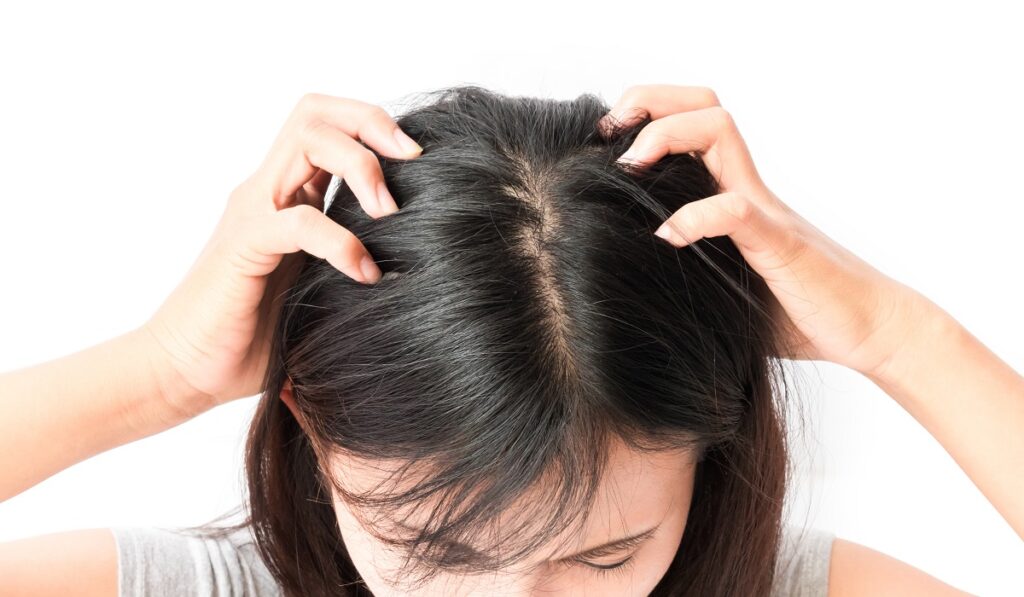- Dandruff and dry scalp are common scalp conditions caused by an overgrowth of Malassezia fungus and a lack of moisture.
- Seborrheic Dermatitis is a more severe scalp inflammation linked to an overproduction of sebum and an overgrowth of Malassezia yeast.
- Psoriasis is a chronic skin condition that causes thick, silvery scales and red patches.
- Treatments for scalp conditions include using medicated shampoo, moisturizing your scalp, avoiding harsh chemicals, and using light therapy or corticosteroid injections.
Have you ever experienced dandruff, itchiness, or redness on your scalp? Scalp conditions are more common than you think—but they can still cause a lot of concern, embarrassment, and discomfort.
Explore some of the most frequent scalp conditions and investigate their reasons to better understand these issues, allowing you to have a more confident and informed conversation with your doctor or specialist.
Dandruff and Dry Scalp
Dandruff, the scourge of people everywhere, can be an incredibly frustrating problem to deal with. You may think dandruff and dry scalp are the same but different. A dry scalp is caused by a lack of moisture, leading to flakes and itching. Dandruff results from oil build-up and dead skin cells on your scalp. It is usually caused by a fungus called Malassezia. This fungus usually lives on your scalp without causing any issues, but it can lead to an overgrowth in some people, resulting in dandruff.
Treating Dandruff and Dry Scalp
Dandruff and dry scalp can be irritating and embarrassing conditions for many people. They can lead to an itchy, flaky, and sometimes even painful scalp. So, how do you get rid of dandruff and dry scalp fast? Here are some tips:
- Use a medicated shampoo: Look for shampoos with active ingredients such as pyrithione zinc, salicylic acid, ketoconazole, or coal tar, as these can help remove and prevent dandruff.
- Moisturize your scalp: Oils like tea tree oil, jojoba oil, and coconut oil can help moisturize the scalp and reduce dryness, but make sure to use them in moderation.
- Brush your hair regularly: Brushing your hair gently with a soft-bristle brush or a comb can help distribute the natural oils on your scalp throughout your hair, which can help prevent dryness and reduce the amount of flakes on your scalp.
- Avoid using hair products with alcohol: Hair products that contain alcohol, such as hair sprays, gels, or mousses, can dry out your scalp and create even more flakes. It is best to avoid using these kinds of products or switch to alcohol-free products.
- Practice good hair hygiene: Wash your hair regularly with lukewarm water and use a gentle shampoo. Avoid hot water, which can strip away the natural oils that protect your scalp.

Seborrheic Dermatitis
Seborrheic dermatitis is another scalp condition related to dandruff but a more severe scalp inflammation. This condition produces red, scaly patches, usually accompanied by severe itchiness. Seborrheic dermatitis’s exact cause is unknown, but several factors can contribute to the problem. These include the following:
Overproduction of Sebum
Seborrheic dermatitis is often associated with an overproduction of sebum, the skin’s natural oil. This can lead to the accumulation of dead skin cells, which can cause scaling, itching, and redness.
Malassezia Yeast
Malassezia is a type of yeast that lives on the skin and scalp. In individuals with seborrheic dermatitis, this yeast can overgrow and cause inflammation, further contributing to the development of the condition.
Environmental and Lifestyle Factors
Certain environmental and lifestyle factors can exacerbate seborrheic dermatitis. Stress, a poor diet, and exposure to harsh chemicals or extreme weather conditions can all contribute to the development of the condition.
Here are some ways to treat seborrheic dermatitis:
- Use medicated shampoo: Look for shampoos with active ingredients such as ketoconazole, salicylic acid, or coal tar to help reduce inflammation and itching.
- Avoid harsh chemicals: Avoid using products containing harsh chemicals such as sulfates and parabens, as these can further irritate your scalp and worsen the condition.
- Manage stress: Stress can worsen seborrheic dermatitis, so it is important to find ways to manage stress levels through relaxation techniques or counseling.
- Eat a balanced diet: Eating a diet rich in healthy fats, proteins, vitamins, and minerals can help reduce inflammation and improve overall health.
Psoriasis

Psoriasis is a chronic condition that causes skin cells to build up rapidly, forming thick, silvery scales and itchy, dry, red patches. Scalp psoriasis is a common form of this disease, affecting half of the people with psoriasis. The exact cause of psoriasis is unknown, but it is believed to be an immune system problem. Stress, genetics, and certain medications can also contribute to the condition.
Here are some ways to treat scalp psoriasis:
- Apply a topical steroid: A doctor may prescribe a topical steroid for mild cases of scalp psoriasis. These steroids help reduce inflammation and itchiness.
- Light therapy: Light therapy, or phototherapy, is a treatment option for more severe cases of scalp psoriasis. This therapy involves exposing the skin to ultraviolet light, which can help reduce inflammation and slow cell growth.
- Topical retinoid: A topical retinoid is a medication that can help reduce inflammation and itching associated with scalp psoriasis.
- Corticosteroid injections: A doctor may inject corticosteroids directly into afflicted areas for more severe cases of scalp psoriasis. This helps reduce inflammation and itching in the targeted area.
Scalp conditions can be embarrassing and uncomfortable, but understanding their causes and treatments can help you better manage these issues. With proper treatment and care, you can reduce the symptoms of scalp conditions and maintain healthy hair.

